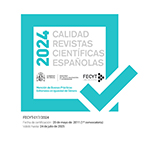Por qué en África no se reconoce la existencia de poblaciones indígenas. Un estudio de caso: los bubis de la isla de Bioko
Resumen
En los estudios africanos europeos es frecuente negar la existencia de comunidades indígenas en África a pesar de que, al igual que el continente americano, África ha sido una región colonizada por Europa. Las nuevas identidades históricas y sociales creadas bajo la colonialidad del poder (Quijano, 2000), perduran en el imaginario político y académico hasta el punto de rechazar la condición indígena actual de una buena parte de los pueblos africanos. Esta cuestión está teniendo una gran relevancia en la política internacional tras el resurgir de la identidad indígena a escala global y en respuesta al sistema capitalista contemporáneo, fortalecida tras la aprobación de la Declaración de Derechos de los Pueblos Indígenas por la asamblea de Naciones Unidas en el año 2007. Mi objetivo en este artículo es deconstruir los procesos históricos que han llevado a rechazar la existencia actual de pueblos indígenas en el continente africano.
El caso de estudio descriptivo que propongo es el de la comunidad bubi, ubicada en la isla de Bioko, la cual se está presentando actualmente en la arena global como pueblo indígena y reclamando sus derechos inherentes. Este caso de estudio es especialmente interesante porque cumple con una doble condición: por una parte, el primer contacto del “encuentro colonial” de este pueblo africano coincide con el mismo periodo histórico en el que se produce el primer contacto y la creación de la id-entidad geocultural denominada América; por otro lado, la colonización efectiva del territorio y su denominación como indígenas será llevada a cabo por la misma id-entidad geocultural —la Europa ibérica—, aunque en diferentes momentos históricos.
Descargas
Descarga artículo
Licencia
La Revista de Antropología Social, para fomentar el intercambio global del conocimiento, facilita el acceso sin restricciones a sus contenidos desde el momento de su publicación en la presente edición electrónica, y por eso es una revista de acceso abierto. Los originales publicados en esta revista son propiedad de la Universidad Complutense de Madrid y es obligatorio citar su procedencia en cualquier reproducción total o parcial. Todos los contenidos se distribuyen bajo una licencia de uso y distribución Creative Commons Reconocimiento 4.0 (CC BY 4.0). Esta circunstancia ha de hacerse constar expresamente de esta forma cuando sea necesario. Puede consultar la versión informativa y el texto legal de la licencia.












